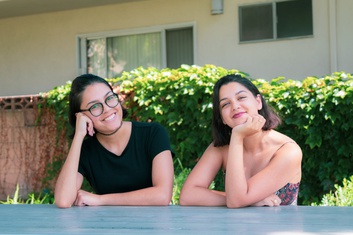The views expressed in our content reflect individual perspectives and do not represent the authoritative views of the Baha'i Faith.
The COVID-19 pandemic and the heightened awareness of racial injustice — the “twin pandemics” — have led to increased stress and anxiety among young people. For two Baha’i sisters and artists, making meaningful music has become a way to find hope for young people and inspire change in a tumultuous world.
Witnessing the collapse of the institutions in our society and the different aspects of life we once took for granted — gathering with friends and family, walking around mask-less, celebrating holidays in large crowds — naturally leads us to experience distress. A recent Chegg study reported that half of high school and college students in the United States feel worried about their mental health during this time.
The Universal House of Justice, the democratically-elected administrative body of the Baha’i Faith, addressed the American Baha’i community in this time of crisis with the following words:
A moment of historic portent has arrived for your nation as the conscience of its citizenry has stirred, creating possibilities for marked social change… Ultimately, the power to transform the world is effected by love, love originating from the relationship with the divine, love ablaze among members of a community, love extended without restriction to every human being… You are channels for this divine love; let it flow through you to all who cross your path.
For Amelia and Juliet Rasekhy, channeling this love comes in the shape of music. Both in their 20s and based in Los Angeles, they’ve used this time to work together on meaningful music.
“I still attend school online, but since our outside activities have transitioned to online and lessened considerably, we have more time to create and collaborate,” Amelia says.
“These ‘twin pandemics’ have further confirmed our initial purpose for writing music: To uplift and elevate souls,” Juliet says. “For too long, our world has been creating and promoting songs that lyrically debase — and has been aggrandizing individuals who conform to this norm. A sense of altruism is lacking in much of popular music.”
Juliet points out that there are, of course, popular songs that promote positive ideas or that talk about social issues in an altruistic way. But most songs aren’t about working towards the betterment of the world, and the music industry primarily produces and promotes songs that channel individual desires.
“Fortunately, these twin pandemics have awakened the fire in many souls to rise up, with love and unity, against the forces of error and ignorance,” she says. “We will always write music that aims to bring light to dark topics.”
RELATED: The Science of Song: How Lyrics Impact Our Minds and Souls
Although both sisters have always been artistically minded, they only began to work as a team in 2017. They moved to Los Angeles together after many years of living apart since graduating from high school in Singapore.
“I had stopped writing music after doing so pretty much my whole life because I felt like writing lyrics didn’t come naturally to me,” Amelia says. “Juliet started to get frustrated with me for giving up, but then when I told her my reason, she said, ‘Well, I write poetry.’ This came as a huge shock to me, especially since we had been sisters for 19 years, and I had never heard a whisper of it. So we started writing a few songs for fun, and we fell into such a natural rhythm of blending my music with her poetry that we decided to pursue it as a career.”
“Juliet is very systematic. She has the ability to be detail-oriented and think conceptually.” Amelia adds. “Whenever we’re writing or mapping out a release, she always asks questions like, ‘Does this particular word give the song a different meaning?’ or, ‘What is the message we are trying to convey?’, which is great because I get so caught up in the music that I forget to think about those things. She also has this crazy imagination that I admire.”
“Amelia has a music brain,” Juliet says. “My mom calls it ‘Mozart brain.’ She hears pretty much everything as music, even when there is no music. When I give her a poem, she hears it as music before there is any melody attached to it, and then she hears the whole song fully produced in her head before she’s even sung one line out loud.”
As a duo, they make a concerted effort to listen to one another and trust each other’s thoughts and feelings — even when they disagree creatively. As Baha’is, they follow the process of consultation, trying to detach themselves from their opinions after they express them; the purpose of which, the Baha’i writings explain, is “to show that the views of several individuals are assuredly preferable to one man, even as the power of a number of men is of course greater than the power of one man.”
“Usually, we end up taking our differing opinions and marrying them. We have a song called “Daisy,” which we wrote really early on before we even decided to start releasing music. After we released “Wayfarer” — our first EP — Amelia was adamant that “Daisy” had to be on our next release, but I was questioning whether our early work was worthy of releasing. After a lot of consultation, we decided that we would release it, but only after reworking both the music style and a few lyrics. It ended up being one of our most popular and highest streamed songs.”
When the COVID-19 pandemic happened, Amelia and Juliet only felt their desire to write meaningful music increase. While living under Los Angeles’ stay-at-home order, and later studying and working remotely, they challenged themselves to create something uniquely significant.
To write these songs, they had to do a lot of “mindful research,” Juliet explains. “We asked our friends what messages they feel are missing from new music — what they think are the defining qualities of this stage of life, among other things.”
“Juliet came up with the period of youth idea as a love letter to our listeners, most of whom are youth who are searching for answers,” Amelia says. “Of course, we don’t have all the answers, but we recognize that much of the music available to this group doesn’t address their needs, or only addresses two minuscule aspects of this period: relationships and rebellion against authority.”
They also turned to the 2013 Baha’i Youth Conference materials written by the Universal House of Justice, which expand upon distorted visions of youth in society: “Popular views, for instance, regard this age as full of confusion and crises. Such thoughts foster conditions in which undesirable patterns of behaviour are spread. A proper understanding of this age is that of selfless young people with ‘an acute sense of justice, eagerness to learn about the universe and a desire to contribute to the construction of a better world.’”
“It highlights the incredible qualities, responsibilities, and powers latent in youth,” Juliet says.
RELATED: What a Writing Workshop for Teens Taught Me About Community
“There is so much more to this time of life,” Amelia says. “It’s disappointing that other topics like anxiety about the future, discovering one’s own talents and capacities, and platonic relationships, aren’t represented.”
Songs from their latest album, “Through the Valley of Search,” often draw inspiration from the writings of the Baha’i Faith and their applications to daily life. The “London Show” is based on the quote from a Baha’i prayer, “I will not dwell on the unpleasant things of life” and asks, “How can I learn to appreciate the [difficulties] I endure?”
Another song, called “Matcha Latté,” was inspired by the quote “backbiting quencheth the light of the heart, and extinguisheth the life of the soul” by Baha’u’llah, the prophet and founder of the Baha’i Faith. The sisters explain that gossip is “such a normal part of society that it’s barely seen as a bad thing. It is so easy to be sucked into this harmful behavior of talking about a friend as soon as they leave the room or saying mean things about a teacher or parent behind their backs. So, to dodge the risk of sounding preachy, we decided to write a light, fun song about how we personally choose not to involve ourselves in backbiting.”
Through these songs and many more, Amelia and Juliet hope to bring hope and inspiration to young people like them. “We are very aware of the overwhelming need of our present society for justice and equality. There is a palpable feeling of restlessness and exasperation towards old social constructs, and we all just want to focus on a new set of laws based on mutual love and respect.”

















Comments
Sign in or create an account
Continue with Facebookor